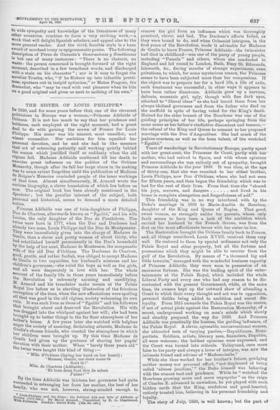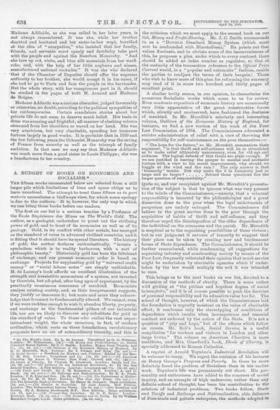THE SISTER OF LOUIS PHILIPPE.* IN 1830, and for some
years before that, one of the cleverest Politicians in Europe was a woman,—Princess Adelaide of Orleans. It is not too much to say that her prudence and boldness, each employed at the right moment, had a great deal to do with gaining the crown of France for Louis Philippe. His sister was his nearest, most unselfish, and wisest counsellor. Her ambition for him equalled her Personal devotion, and he and she had in like measure that art of scheming patiently and working quietly behind the scenes which justified itself so suddenly when the old tegime fell. Madame Adelaide continued till her death to exercise great influence on the politics of the Orleans iitonarchy, though after its fall her large share in its making Witti to some extent forgotten until the publication of Madame do Boigne's Memoirs reminded people of the inner workings of that time. Almost simultaneously, M. Arnaud wrote the curious biography, a clever translation of which lies before us 'low. The original book has been already mentioned in the Spectator; but the peculiar interest of the subject, both Personal and historical, seems to demand a more detailed notice.
Princess Adelaide was one of twin-daughters of Philippe, 13110 de Chartres, afterwards known as " Pgalite," and his wife Laois°, the only daughter of the Duo de Pentbievre. The twins were born in 1777, when the Due and Duchess° had already two sons, Louis Philippe and the Due do Montpensier. They were immediately given into the charge of Madame de Geniis, then a clever and pretty woman of about thirty, who bad established herself permanently in the Duc's household bY the help of her aunt, Madame de Montesson, the morganatic Wife of the old Duo d'Orloans. The Duchesse de Chartres, good, gentle, and rather foolish, was obliged to accept Madame uo Geniis in two capacities, her husband's mistress and her children's governess,—she ruled the boys as well as the girls, and all were desperately in love with her. The whole account of the family life in those years immediately before ti,,rhe Revolution is extremely amusing and unedifying. Arnaud and his translator make scenes at the Palais °Yal live before us in startling illustration of the frivolous corruption of the time, when the new affectations were spoiling all that was good in the old' regime, society welcoming its own It was such lives as these of "Egalite " and his followers that brought about and deserved the Revolution. His wife ,was dragged into the whirlpool against her will; she had been !Drought up to better things in the far finer atmosphere of her lather's house. A few years later she watched with helpless a:_.user the society of sneering, declaiming atheists, Madame de t"elllitee chosen friends, who created the atmosphere in which cr..er Children were brought up. By this time Madame de u.„ culls had given up the pretence of sharing her pupils'
/11
u_evotion. with their mother. When "barely three years oia " 2 twins were taught this kind of thing :— "Mlle. d'Orl6ans (laying her hand on her heart) • Maman, Geniis, COS deux noms-la Sout
Mlle. de Chartres (Adelaide) : 'Et tous deux font dire de memo name!'"
Ey the time Adelaide was thirteen her governess had quite _reeeded in estranging her from her mother, the best of her who was not, however, strong-minded enough to Zsuis-Ppps and hie Sister : the Political Life and Role of AdSaide of —seas, (1177.18471:0 with Portrai By Raoul Arnaud. Translated by E, L. Charlwood. ta. mica : David Nutt. [10.. ed. nat.] remove the girl from an influence which was thoroughly practical, clever, and bad. The Duchess's efforts failed, as they were bound to do, and when Orleanist intrigues, in the first years of the Revolution, made it advisable for Madame de Geniis to leave France, Princess Adelaide—the twin-sister had died in childhood—was one of the party of young people, including "Pamela" and others, whom she conducted to England and led rounelsto London, Bath, Bury St. Edmunds, Isleworth, Ste., during months of strange experiences, even privations, to which, for some mysterious reason, the Princess seems to have been subjected more than her companions. If the object was to prepare her for a hard life, a life of exile, such treatment was successful; in other ways it appears to have been rather disastrous. Adelaide grew up a nervous, delicate, eccentric girl, ugly, though with fine dark eyes, attached to "liberal ideas" as she had learnt them from her always idolised governess and from the father who died on the scaffold in spite of having voted for the King's death. Hatred for the elder branch of the Bourbons was one of the guiding principles of her life, perhaps springing from the same cause as her father's vindictive discontent and treason,— the refusal of the King and Queen to consent to her proposed marriage with the Duo d'AngoulAme. She bad much of the jealous sourness, as well as the keen talent, of the wretched " Egalite." Years of wanderings in Revolutionary Europe, partly spent with her great-aunt, the Princess° de Conti, partly with her mother, who had retired to Spain, and with whose opinions and surroundings she was entirely out of sympathy, brought Princess Adelaide to the year 1808. It was then, at the age of thirty-one, that she was reunited to her eldest brother, Louis Philippe, now Due d'Orleans, whom she had not seen for fifteen years, and then began the friendship which was to last for the rest of their lives. From that time she "shared his joys, sorrows, and dangers and lived in his home in complete abnegation and forgetfulness of self." This friendship was in no way interfered with by the Duke's marriage in 1809 to Marie-Amelie de Bourbon, daughter of the King and Queen of Naples. That good, sweet woman, so strangely unlike her parents, whose only fault seems to have been a lack of the ambition which carried her husband to the French throne, was from the first on the most affectionate terms with her sister-in-law. The Restoration brought the Orleans family hack to France, and, all things considered, Louis XVIII. received them very well. He restored to them by special ordinance not only the Palais Royal and other property, but all the fortune and possessions which they might be able to recover from the gulf of the Revolution, By means of "a thousand big and little lawsuits," managed with the wonderful business capacity of Princess Adelaide, they were soon in possession of an enormous fortune. She was the leading spirit of the enter- tainments at the Palais Royal, which included the whole Liberal Party and every one who had any reason to be dis- contented with the present Government, while, at the same time, its owners kept up the outward show of attending a Court to which their every thought and act was in opposition, personal dislike being added to ambition and secret dies loyalty. From 1815 onwards the Palais Royal was the centre, if not of actual plots against the Restoration Monarchy, of a secret, underground working on men's minds which slowly and steadily prepared the way for 1830. And Princess Adelaide was practically the hostess, the guidinginfluence, of the Palais Royal. A clever, agreeable, unconventional woman, she attracted men of varying parties,—Republicans, Bona- partists. Soldiers, artists, literary men, financiers, Deputies, all were welcome; the boldest opinions were expressed, and the Court was turned into ridicule. Talleyrand, once more false to his party and always a lover of intrigue, was now the intimate friend and adviser of "Mademoiselle." While she thus worked for her brother's future, grudging neither money nor personal effort, "not displeased at being called altesse jacobine,' " the Duke himself was behaving with the utmost tact and prudence. While he "watched the Bourbons growing more and more unpopular" as the reign of Charles X. advanced in unwisdom, he yet played with such hidden cards that the King, credulous and good-hearted, entirely trusted him, believing in his personal friendship and loyalty. The story of July, 1830, is well known; but the part of :Madame Adelaide, as she was called in her later years, is not always remembered. It was she, while her brother -doubted and hesitated and her sister-in-law wept, horrified at the idea of "usurpation," who insisted that her family, 'friends, and servants must openly and decidedly take part with the people and against the Bourbon Monarchy. "And she tore up red, white, and blue silk materials from, her ward- robe, and, with the help of her little nephews and nieoes, 'manufactured national cockades." It was she who declared that if the Chamber of Deputies should offer the supreme authority to her brother, she would accept it in his name, if she had to go to Paris and face the people on the barricades. I But the whole story, with her conspicuous part in it, should ' be studied in the pages of both M. Arnaud and Madame . de Boigne.
Madame Adelaide was a curious character, judged favourably ' or otherwise, no doubt, according to the political sympathies of her contemporaries. Certain scandalous stories about her I private life do not seem to deserve much belief. Her taste in dress was amazing and frightful; all manner of clashing colours streamed from her shoulders or waved on her head. She was very avaricious, but very charitable, spending her immense fortune largely in good works. It is probable that in 1830 and the few following years the Orleanist Monarchy was the saving of France from anarchy as well as the triumph of family ambition, In that case we may say that Madame Adelaide was much more than a good sister to Louis Philippe ; she was a benefactress to her country.























































 Previous page
Previous page